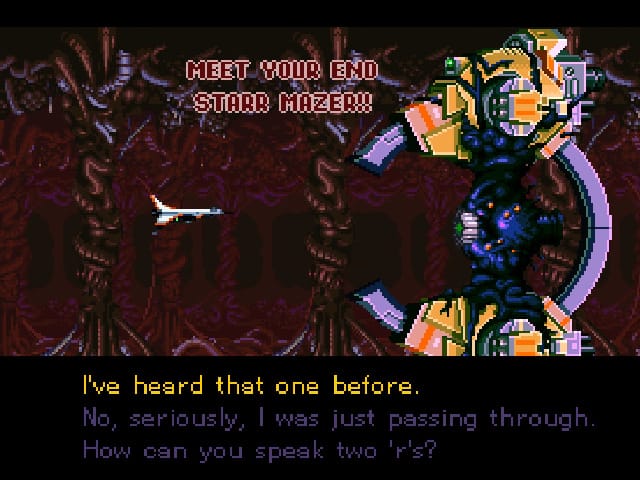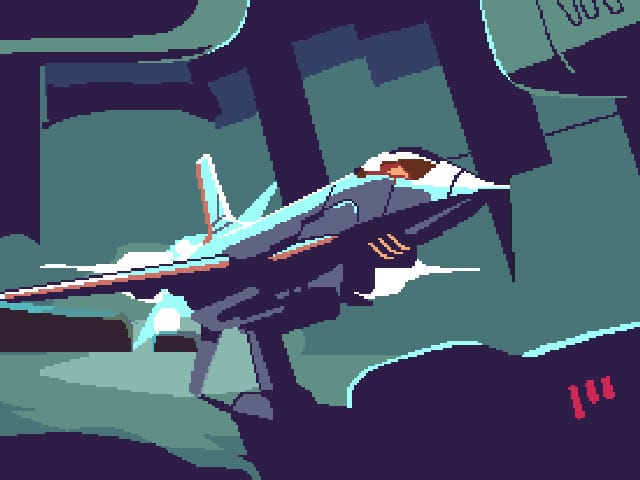Starr Mazer has always been real

Before today, you would have been forgiven for not knowing what the fuck to make of Starr Mazer. The only proof of the adventure game-shmup hybrid’s existence was a 2012 Vimeo trailer that apparently was part of an animator’s demo reel. That is the logical conclusion anyone dutifully Googling and curious would arrive at. But today? This game that has been fighting for a chance to be made since 2010 is a real possibility, one of many now swimming furiously upstream for your attention.
It took them half a decade to get to this point, but something that’s always been out of their control is this notion that Starr Mazer was fake.
Here’s where it gets a little complicated. And to fully grasp where all this confusion stems from, we have to rewind to 2010.
At the behest of his best friends, Thacker quit his job in Chicago as an enterprise programmer and head of technology at a very large marketing firm to start a film company. “You’ve probably unscrewed caps from the sodas whose games and sweepstake codes I was responsible for,” Thacker says.
But instead of going right out and making Starr Mazer right away, Thacker started a film company, Imagos Films. “Of the things that I wanted to pursue, films seemed to work first,” says Thacker. “I could get there faster.”
Something that’s always been out of their control is this notion that
Starr Mazer was fake.
Also, if he was quitting his job, he had to get somewhat practical. After all, he had just “lit a six-figure salary on fire,” spent all his savings, and took a 75 percent hit cashing in his 401k. For Starr Mazer to be a possibility, Imagos had to be a lucrative, viable venture.
Amazingly, Thacker did exactly that, and made Imagos a success. All the while, though, he kept his eye on the ball, and used the last five years of Imagos’ growth as a way deeper into games. At the outset, Imagos pitched a movie called Motivational Growth, it got a budget, and it came out in early 2013. It was a “bit of a success,” got snatched up for distribution by Devolver Digital, which in turn also lead to Thacker getting work with PixelJAM Games doing game design, writing and development. Although serendipitous, none of this was by accident: Motivational Growth was part of Thacker’s greater strategy to “only do videogame stuff.” For starters, Thacker says, the film’s soundtrack is the first film to have an entirely chiptune soundtrack.
“The gag [with] Motivational Growth was I have a main character who travels into his television,” says Thacker. “The film takes place in 1991, so I was interested in putting things on the TV that was reflective of that.”
It was in there that Thacker saw an opening to start making Starr Mazer: Shmups and adventure games, arguably, were at their height in the early ‘90s, so it would stand to reason that they could be put together in this film’s reality, and on the TV for the film’s protagonist to wander into.

But this mash-up was no accident: It’s a combination Thacker has wanted to explore his entire life. So, it’s no surprise that he went a little overboard when finding a way to shoehorn in some of his dream game into his feature film. He scrapped a planned telenovela from the script (El Demonio Que Hace Que Los Trofeos De Los Hombres), and allocated some of the film’s budget to, basically, start making a trailer for his dream game.
“I took a design doc that I had been working on since I was a small child, wrote a script element from it,” says Thacker, “And I sent that to Jérémie Périn through his representation. That got us talking.”
Périn is a director and animator of measurable Internet fame who has made a few extremely NSFW, but highly shareable web videos like a music video back in 2009 for Flair’s “Truckers Delight.” The result of Thacker’s collaboration with Périn back in 2010 was this, the video that eventually ended up surfacing in 2012:
Thacker remembers getting “annoyingly obsessive” about tons of tiny details in making what was supposed to be just something to slide into his feature film, and that care and passion shines through in this inexplicable 39-second clip: The correct response to this Vimeo video after viewing should be, “Aw, why isn’t this real?”
In April 2014, when the Internet explicably spiked with people taking notice of this trailer, that was the general reaction. But the thing was: Nobody really understood what Starr Mazer was, or who was responsible for it.
That’s because whereas when Périn’s work on the trailer was done, Thacker still had to finish making the rest of his film, do post-production, and then finally promote it. The plan, though, was for Thacker and his team to loop back around with Périn and get to work on Starr Mazer. “But literally, I had to take a year and a half to promote Motivational Growth,” says Thacker. “I had to travel all over the world. I had to win awards in Paris and Australia for this film, so I couldn’t get to Starr Mazer right then.”
As that was winding down, Thacker also moved from Chicago to Seattle at to make inroads with the indie-dev community out in the Pacific Northwest.
“I’m from Detroit, man. Chicago is a mystery to me,” says Thacker. “The indie scene in Chicago [was] a little less penetrable than Seattle.”
The correct response to this Vimeo video after viewing should be, “Aw, why isn’t this real?”
But while Thacker was going all over to hustle Motivational Growth and move his company, Périn was growing impatient. Thacker says he started getting emails from Périn asking for permission to put the work they did together on Starr Mazer on his reel. They started to pile up, and Thacker was too subsumed with PR duties to stay on top of his inbox. The emails went from, “Hey man I really want to put this on my reel, is that okay with you?” to one note that finally said, “I put this on my reel.”
And as Thacker says, “He’s a famous dude. If he tweets a thing out, it’s out there.”
So people thought it was some sort of game project Périn was working on—even though he wasn’t. Further confusing the matter was that neither was Thacker and his team: They were working all this time getting to the point of making Imagos a lucrative, sustainable business while also getting their bonafides in the Seattle indie-dev scene and taking on contract jobs—things like the commercial for Jazzpunk, writing for Robot Loves Kitty’s Upsilon Circuit, and assisting on design with Rocketcat Games’ “Death Road to Canada.” Making Starr Mazer is not something Thacker, a self-proclaimed “quiet games industry veteran” who has done development and design on more than 20 titles, took lightly, so he didn’t want to rush into it.
Thacker also is quick to point out that he and Périn are still tight, and Périn is helping out on the game in a support role.

And over the years, Thacker has had plenty of time to refine his vision of what Starr Mazer should and shouldn’t be.
Says Thacker, it is not a PNCASHMUP (point ‘n’ click and shmup): “We’re not making a game that’s a combination of two game types. We’re making a single new game type. In a point and click world, I want to at any point walk over to my awesome ship, jump in, and go fight some things or fly around and discover some stuff. That’s Starr Mazer.”
Certainly, this hybrid approach to adventure gaming isn’t anything new. In Full Throttle you could hit the road and punch other bikers. Even Indiana Jones and The Last Crusade had janky—and largely optional—fistfights. So what makes Starr Mazer special?
“Shmups are pure action and point-and-click adventures are pure story,” says Thacker. “Their control mechanisms are distinct, their themes are distinct. One is distinctly about being slow and meticulous, and the other is distinctly about being fast and twitch. I love making the player able to choose what they want, when.”
Thacker says the the point-and-click adventure is not a pixel hunt and the shmup is not a bullet hell. In other words, expect more Grim Fandago than Gabriel Knight in the former and more Gradius than Ikagura in the latter.
I want to at any point walk over to my awesome ship, jump in, and go fight some things or fly around and discover some stuff. That’s
Starr Mazer.
But, again, these are two game worlds that will impact and affect one another. Explains Thacker, the shmup is “procedurally chunked” so moments stack together in appropriate circumstances with enemies and patterns all grown from what you’ve been doing. “If you pissed off the bartender and he’s got some pals in the mercenary groups,” says Thacker, “Those groups are gonna come tell you why they’re gonna shoot you, and then they’re gonna shoot you.”
But if shooting isn’t your bag and you wanna stick around in the point-and-click world or vice versa, there will be “consumables” available to enable you to spend more time in whatever play style you excel at best or prefer.
And if that sounds confusing—it’s nothing compared to the army crawl Starr Mazer had to embark on just to get onto Kickstarter in the first place.



